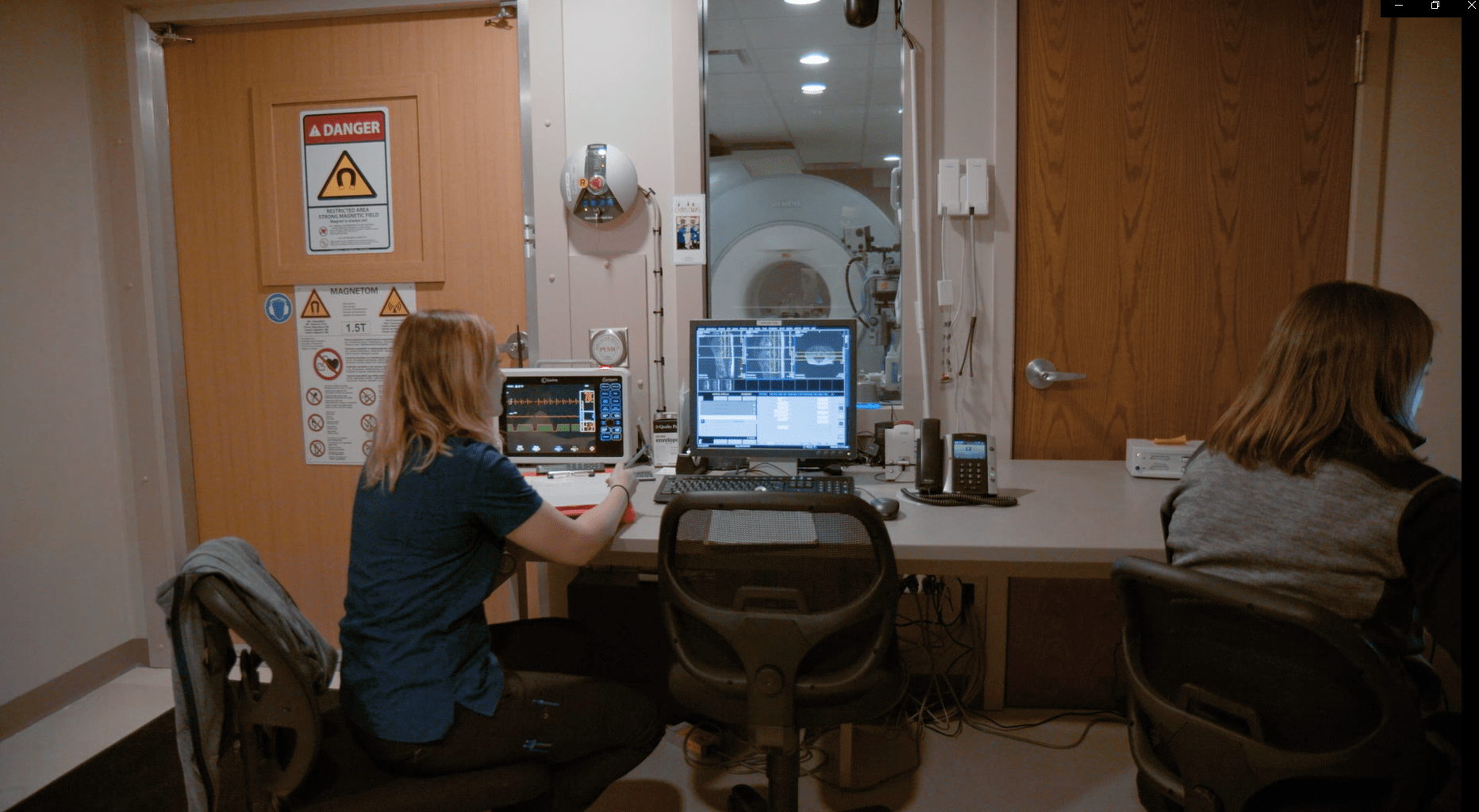The MVS Neurology Department
Madison Veterinary Specialists is led by Drs. Joy Delamaide Gasper and Jeanie Lau, board-certified veterinary neurologists who are trained in all aspects of veterinary neurology and neurosurgery. Neurological problems include a variety of disorders from head to tail. We start by listening to you and the description of what has changed since your pet became neurologically abnormal. Then, we evaluate your dog or cat with a neurological examination. During the examination, we work with the pet to go through a series of tests: walking (if they’re able), checking the ability of the nerves to the head/face and limbs, checking strength, coordination, and evaluating if the pet is painful. If your pet seems painful, we will try to treat it as soon as possible.
Our main focus with the neurological examination is to decide where the neurological problem is within the neurological system. From the examination, we provide consultation regarding the possible causes of the problem, testing that can be performed to make a specific diagnosis, and then treatment options. It is also very important to us to try to avoid stressing out the patient as much as possible. Some pets that are dealing with a neurological problem can show anxiety or aggression, and many parts of the neurological system can still be evaluated with a hands off approach.
The Madison Veterinary Specialists neurology service offers:
- MRI of the brain, ears and spinal cord
- CT of the head/ears and spinal cord in some cases
- Spinal tap and cerebrospinal fluid analysis
- Muscle biopsy
- Surgery for IVDD with disc herniation such as hemilaminectomy or ventral slot
- Surgical debulking and biopsy of spinal or brain tumors
- Treatment & management of seizure disorders
- Treatment & management of vestibular disorders (balance problems)
- Diagnosis, treatment and management of neuromuscular disorders (problems in the nerves, muscles, or where the nerves meet up with the muscles) such as myasthenia gravis
The Madison Veterinary Specialists neurology service takes a holistic approach and considers all aspects of your pets needs before making recommendations for treatment and management. We may adjust medications that your pet has been on, in addition to adding new medications that may help. We want to help your dog or cat have the best quality of life, trying to improve mobility and help the pet be as independent as we can.
Advanced Imaging and Procedures
Our neurology service performs advanced imaging (CT and /or MRI) of the head (brain and ears) and vertebral column (spine). General anesthesia is needed for these tests, and we have anesthesia training and monitoring that helps keep this testing as safe as possible. We take the team approach and consult with other veterinary specialists as needed. For example, if your pet has chronic severe ear infections, then we may ask our veterinary dermatologist to help with treatment of the underlying problem. Another common example is if we find that your pet is having difficulty walking from a problem in the joints whether it’s a torn ligament or polyarthritis from an auto-immune disorder, then we will work with the other specialists to make sure your pet gets the right treatment.
MRI
Madison Veterinary Specialists now offers high-field (1.5T) Magnetic Resonance Imaging (MRI)! You may have never thought your dog or cat would need an MRI, and you may be asking, what really is an MRI? Magnetic Resonance Imaging (MRI) is a way of taking a picture of the internal structure of your pet’s nervous system. It is not an invasive test, and it does not cause your pet pain. It measures the way the water molecules in your pet’s cells move and reports it back to the computer so it can show us the internal structure. The MRI machine is loud and the patient needs to be as still as possible, so general anesthesia is required. The pictures that the MRI shows will tell us if there is a change in the shape / structure of the nervous system, and we use the image characteristics to determine what kind of problem could be causing it. We look at the MRI pictures and evaluate them for signs of inflammation, degeneration of any tissues, compression or bruising of the spinal tissues from trauma, blood clots, or disc material, cancerous growths or tumors that could be benign or malignant. We also evaluate for birth defects, genetic disorders and the list goes on! The neurologist evaluates and interprets the images as they’re being obtained so that results are available quickly. A board-certified veterinary radiologist may also evaluate the MRI if needed.
If needed and if the MRI shows it is safe, then a spinal tap is performed by the veterinary specialist. This procedure takes a small sample of the fluid that is normally around the brain and spinal cord to check for inflammation and some forms of cancer. Cerebrospinal fluid (CSF) analysis can be used to diagnose several different neurological disorders such as cancers of the white blood cells (lymphoma) or some neurological tumors, Meningoencephalitis of unknown etiology (MUE, MUO, GME), Steroid Responsive Meningitis Arteritis (SRMA), infections (blastomycosis, toxoplasma, canine distemper).
IVDD
Madison Veterinary Specialists neurology service specializes in surgical procedures to treat Intervertebral Disc Disease (IVDD). All breeds of dogs can be affected by IVDD. This is a disease where as a dog ages, there is degeneration of the disc where it becomes more fragile and brittle. Dogs don’t have to sustain a trauma, and just normal daily activity and movements can result in the vertebrae moving and pressing on a disc causing it to rupture or herniate. There are some breeds that we see more commonly needing surgery for their disc problems. Miniature dachshunds, French bull dogs, Pekingese, Beagles, Cocker Spaniels, Pembroke corgis, are a few of the breeds that we see most commonly for IVDD. These breeds are predisposed to IVDD Hansen Type I. This means that there is a sudden (acute) rupture or herniation of the intervertebral disc. These patients could show pain, weakness and wobbliness when they’re walking, or they could become suddenly paralyzed and unable to walk in the hind end. The patient could be seen on an appointment basis; however, it is common for patients to come in to MVS on an emergency basis for evaluation when they are paralyzed. CT and/or MRI are performed of the region of the spine that seems to be affected from the examination of the dog or cat. Then, if the spinal cord is compressed, we may recommend surgery to decompress the problem. This surgery includes either a hemilaminectomy (in the mid-back to lumbosacral region) or ventral slot (in the neck). Both of these procedures can have a very good outcome and can help the patients get back up and walking – even running! The neurological system can sometimes recover from severe injuries, and we find it very rewarding to see these patients after surgery get back to a good quality of life.
Some dogs have a different form of IVDD, called Hansen Type II, where the disc degeneration is more gradual and there is bulging of the disc to compress the nerves. The breeds more predisposed to this type of IVDD are German Shepherds, Labrador Retrievers, Golden Retrievers, and giant breed dogs. These dogs can have more gradual onset of paralysis, or in some cases they can get suddenly worse and go down. At any rate, there can also be surgical decompression in these cases that can help the patient get up and walk again.
Feline Neurology
Madison Vet Specialists Neurology Service specializes in evaluation of cats for different forms of neurological disorders. Cats may develop seizure disorders, which could be from infections, cancerous tumors, auto-immune disorders, genetic diseases, or idiopathic (no identifiable cause). Some cats may develop spinal problems that can also be from the causes listed above. It is less common, but some cats also have intervertebral disc herniations. Surgical decompression or medications can be used to treat these problems and improve the neurological signs.
Seizures
Madison Vet Specialists Neurology Service specializes in evaluation of dogs and cats with seizures (also called fits or convulsions). Seizures can be caused by a variety of underlying problems. Treating the underlying problem can help reduce seizure frequency and severity. In many dogs and some cats, seizures occur because of a genetic predisposition to seizures called Idiopathic Epilepsy). This can be treated with several different medications, including phenobarbital, levetiracetam (Keppra®), zonisamide (Zonegran®) and potassium bromide. Our neurologists can prescribe and adjust dosages for these medications. We always try to balance reducing seizure activity while maximizing quality of life. We will also talk with you about treatment options for emergency situations, as well as alternative therapies and management strategies.
Vestibular Syndrome
Vestibular syndrome means there’s a problem affecting the balance system. Dogs and cats can have vestibular syndrome with all or some of the following clinical signs: tilting their head so one ear is lower than the other, abnormal eye movement where the eyes are flickering back and forth called nystagmus, nausea from motion sickness (vomiting, poor appetite), and difficulty walking due to wobbliness, falling and stumbling. The Madison Veterinary Specialists Neurology service will use the examination to try to determine if either the inner ear (peripheral vestibular system) or brain itself (central vestibular system made of the brainstem and cerebellum) is affected. CT or MRI may be recommended to determine the underlying cause. Treatments may include antibiotics, steroid treatment such as prednisone. The in-hospital team will provide careful and attentive nursing to help your off-balance dog be as comfortable as possible.



